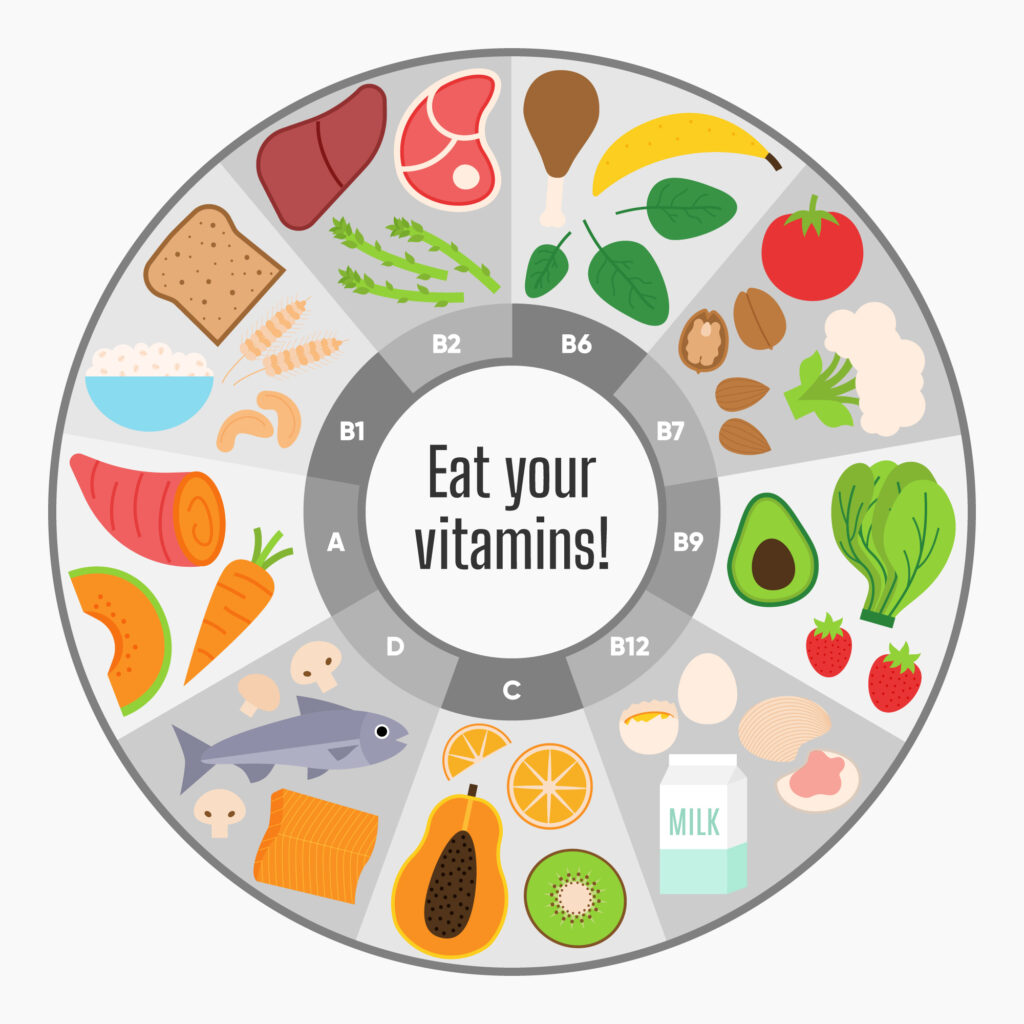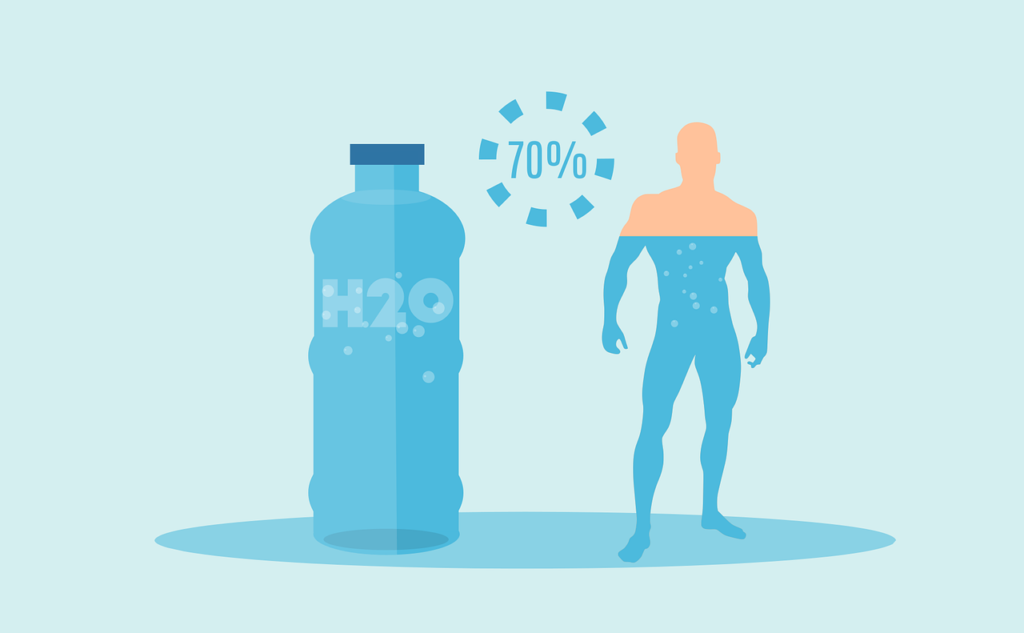Nutrition plays a vital role in supporting our fitness goals, enhancing performance, and promoting overall well-being. In this article, we’ll dive into the world of nutrition and its impact on fueling your fitness. From understanding macronutrients and micronutrients to exploring meal planning strategies and debunking common nutrition myths, we’ll provide valuable insights and practical tips to help you nourish your body and achieve optimal performance
The Building Blocks of a Balanced Diet
Macronutrients are the essential components of a well-rounded and nourishing diet. They consist of carbohydrates, proteins, and fats, each playing a vital role in fueling the body for physical activity and promoting overall health.
- Carbohydrates: are the body’s primary source of energy. They provide fuel for daily activities and exercise, ensuring optimal performance. Healthy carbohydrate sources include whole grains, fruits, vegetables, and legumes. choose complex carbohydrates over refined ones, which can benefit from sustained energy levels, improved digestion, and better nutrient absorption.
- Proteins: are the building blocks of cells, tissues, and muscles. They are essential for muscle repair, growth, and maintenance. Incorporating high-quality protein sources such as lean meats, poultry, fish, eggs, dairy, and plant-based options like legumes, tofu, and quinoa is crucial for meeting protein requirements. Adequate protein intake supports muscle recovery after exercise and promotes satiety, helping individuals feel fuller for longer.
- Fats: are often misunderstood but are necessary for overall health and well-being. They provide energy, support brain function, aid in the absorption of fat-soluble vitamins, and contribute to hormone production. Opt for healthy fats like avocados, nuts, seeds, olive oil, and fatty fish, while limiting saturated and trans fats found in processed foods. Including a moderate amount of healthy fats in your diet can promote heart health and enhance nutrient absorption.
- Establishing the right balance of macronutrients depends on individual factors such as age, gender, activity level, and specific health goals. For example, athletes may require a higher proportion of carbohydrates to support intense training, while those aiming for weight loss may benefit from a slightly higher protein intake to promote satiety and muscle preservation.

Power of Micronutrients
Micronutrients, consisting of essential vitamins, minerals, and antioxidants, are the unsung heroes of our diet, playing a crucial role in supporting vital functions and promoting optimal health and fitness.
- Vitamins are essential for numerous bodily functions, including energy production, immune system support, and the synthesis of hormones and enzymes. They act as catalysts in various biochemical reactions, ensuring our bodies operate efficiently. Sources of vitamins include fruits, vegetables, whole grains, and lean proteins. By consuming a diverse range of colorful plant-based foods, individuals can obtain a spectrum of vitamins, each with its unique health benefits.
- Minerals, such as calcium, iron, zinc, and magnesium, are essential for bone health, oxygen transport, immune function, and muscle contractions. Incorporating mineral-rich foods like leafy greens, nuts, seeds, legumes, and dairy products can help meet daily mineral requirements. Each mineral plays a vital role in our body’s complex systems, contributing to overall health and wellness.
- Antioxidants, found in abundance in colorful fruits and vegetables, protect our cells from oxidative stress and reduce the risk of chronic diseases. They neutralize harmful free radicals and support immune function. Berries, citrus fruits, leafy greens, and colorful vegetables are excellent sources of antioxidants. Including a variety of these foods in our diet helps combat inflammation and supports recovery from exercise-induced oxidative damage.
Meal Planning for Fitness
When it comes to pre-workout meals, it’s essential to consume a balance of carbohydrates and protein. Carbohydrates serve as the primary energy source, while protein helps repair and build muscle tissue. Opt for complex carbohydrates like whole grains, fruits, and vegetables, paired with lean proteins such as poultry, fish, tofu, or legumes. This combination provides sustained energy and supports muscle recovery during and after your workout.
After an intense workout, your body requires nutrients to replenish glycogen stores and aid in muscle repair. Including a post-workout meal rich in carbohydrates and protein is crucial. This can be as simple as a protein shake or a balanced meal consisting of lean protein, whole grains, and vegetables. Aim to consume this meal within the first hour after your workout to optimize recovery.
In addition to structured meals, healthy snacking throughout the day can provide sustained energy and prevent overeating. Opt for nutrient-dense snacks like Greek yogurt with berries, nuts and seeds, or vegetable sticks with hummus. These options offer a combination of protein, healthy fats, and fiber, keeping you satiated and supporting overall health.
To effectively implement meal planning, set aside time each week to plan your meals and create a shopping list. Consider your fitness goals, dietary preferences, and any specific nutritional requirements. Prepare meals in advance, such as batch cooking, to ensure you have nutritious options readily available during busy days. This not only saves time but also helps you make mindful food choices.
Listen to your body’s hunger and fullness cues and adjust portion sizes accordingly. While meal planning provides structure, it’s important to remain flexible and responsive to your body’s needs. Everyone’s nutritional requirements are unique, so working with a registered dietitian or nutrition expert can provide personalized guidance and support.
Hydration for Peak Performance
Fluid intake guidelines vary depending on factors such as age, sex, activity level, and environmental conditions. However, a general recommendation is to aim for at least 8 cups (64 ounces) of fluids per day. This can include water, herbal teas, and low-sugar beverages. It’s important to listen to your body’s thirst cues and drink fluids throughout the day, not just during exercise sessions.
Electrolytes play a crucial role in hydration, as they help maintain fluid balance and support proper muscle function. Electrolytes such as sodium, potassium, and magnesium can be obtained through a balanced diet that includes foods like bananas, leafy greens, nuts, and seeds. For prolonged or intense exercise lasting more than an hour, sports drinks or electrolyte-enhanced beverages can help replenish electrolyte stores.
Developing effective hydration strategies is essential for optimizing fitness results. Start by hydrating before your workout or physical activity. Aim to drink 16 to 20 ounces of water 2 to 3 hours before exercise and another 8 to 10 ounces 10 to 20 minutes before starting. During exercise, particularly if it’s intense or lasts longer than an hour, aim to consume fluids regularly. Sip on water or a sports drink every 15 to 20 minutes to maintain hydration levels.
After exercise, replenishing fluids is crucial for recovery. Drink 20 to 24 ounces of fluid for every pound lost during exercise. This helps restore hydration levels and supports the body’s recovery processes. Additionally, consuming water-rich foods like fruits and vegetables can contribute to overall hydration.

Separating Fact from Fiction
In the world of nutrition and fitness, misinformation can easily spread, leading to confusion and potentially harmful dietary choices.
One prevalent myth is that certain foods or supplements can magically burn fat or boost metabolism. While some foods may have slight metabolic effects, the overall impact on weight loss or metabolism is minimal. Sustainable weight management is best achieved through a balanced diet, regular physical activity, and a caloric deficit if weight loss is the goal.
Another myth revolves around carbohydrates, with some suggesting that they should be completely eliminated from the diet for weight loss or improved health. In reality, carbohydrates are an essential macronutrient that provides energy for the body and fuels physical activity. The key lies in choosing whole grains, fruits, vegetables, and legumes, which offer valuable nutrients and fiber.
Protein is often associated with muscle building and athletic performance, leading to the myth that consuming excessive amounts will automatically result in bigger muscles. While protein is vital for muscle repair and growth, excessive intake beyond the body’s needs is unlikely to provide additional benefits.
The notion of “good” and “bad” foods is another myth that perpetuates an unhealthy relationship with food. No single food should be vilified or considered off-limits. Instead, focusing on overall dietary patterns and making mindful choices can contribute to a balanced and sustainable approach to eating. Moderation, variety, and portion control are key principles to incorporate into a healthy lifestyle.
Supplements are also surrounded by myths, with many people believing they can replace a well-rounded diet. While certain individuals may benefit from specific supplements due to nutrient deficiencies or specific health conditions, the majority of nutrients should ideally come from whole foods. Supplements should be used judiciously and under the guidance of a healthcare professional.
Final Thoughts
The key to fueling your fitness lies in adopting a balanced approach to nutrition. Debunking myths, focusing on whole foods, and making informed dietary choices are essential steps towards achieving optimal health and performance. Understanding the significance of macronutrients, incorporating meal planning, staying properly hydrated, and seeking evidence-based information, you can empower yourself to make sustainable dietary choices that support your fitness goals. Remember, nutrition is a vital component of overall well-being.